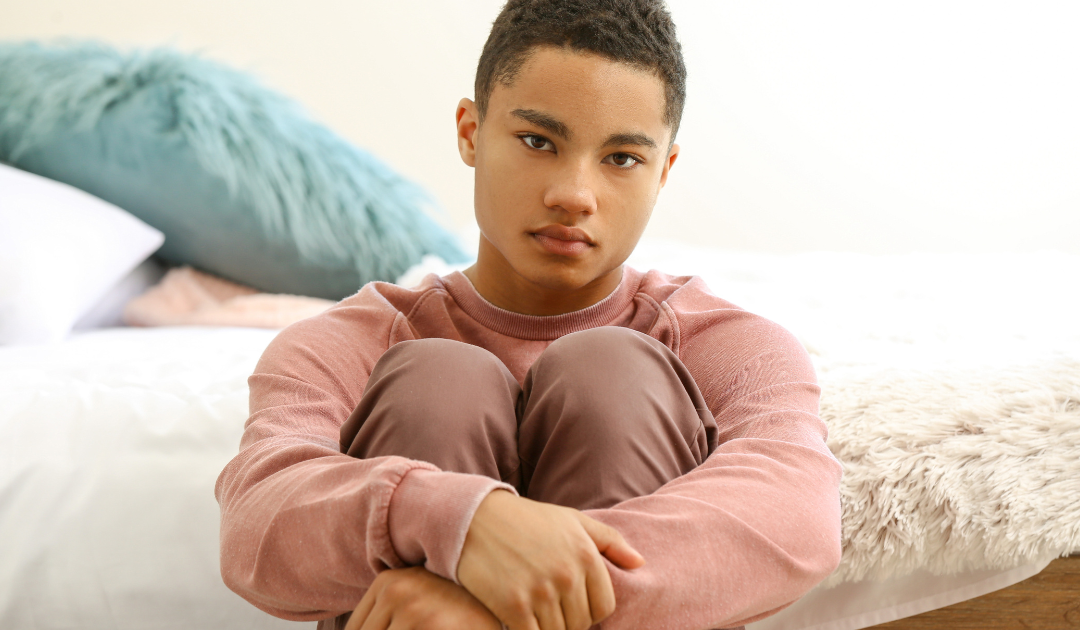Body image issues are common and not just “a female thing”. Boys and men have body image problems too. Male body image issues can be harder to identify than females’. So how can you tell if your son is struggling with male body image issues? And what do you do?
Let’s back up and talk about body image more generally.
Perception of how attractive, acceptable, and healthy your body is begins early in childhood.

And, body image continues to develop as you age, and as you’re given feedback on your body.
Feedback can be direct (e.g. from parents, pediatricians) or indirect (social media, cultural messages). Wanted or unwanted.
Internalizing an image of your body is automatic and not necessarily accurate. Rather, it is subjective – a kaleidoscope created by lots of different images, feelings, thoughts, and experiences.
So, at its most basic level, body image is the relationship you have with your body.
In other words, if you have a body, you have a body image. And relationships, of any sort, can at times be rocky. Body image is no exception.
Why’s body image important?
Having a decent relationship with your body means you:
- feel OK about how you look
- accept your body
- feel proud about what your body can do
- take care of your body

A poor relationship with your body means you’re more likely to have:
- depression
- low self esteem
- unhealthy weight/eating behaviors
- anxiety
- perfectionism

Identifying if your son is having body image problems can be difficult for many reasons, including:
1. Body image problems are historically thought just to affect girls or gay men. (Hear this: The gender gap is closing. And body image issues among boys/men are catching up.)
2. Boys are less forthcoming about negative body image because of societal beliefs that body image is just a girl thing. (See #1 above!)
3. Negative body image for boys tends to be different from the type girls report. Boys’ body image issues are more often something like not having a 6 pack (ab muscles) or not being ripped (muscularly defined) enough. Rarely is their negative body image due to a drive for thinness. Rather, it is more often a drive for muscularity. (There are of course exceptions.)
What are some signs your son might be struggling with body image issues?
- Preoccupation with his appearance
- Restrictive eating
- Use of supplements
- Spending lots of time at the gym
- When participating in a sport (wrestling, skating, gymnastics) where weight and/or appearance are central, body image issues intensify
- Increased emphasis on weight, appearance, food
- Denial that there is a body image problem
- Compulsive body checking
- Intense interest in workouts, steroids, protein shakes, ‘clean eating’
- Referring to himself or his body pejoratively.

Most often, male body image issues arise in puberty. No surprise!
Puberty is typically a time of massive change, internally and externally, for everyone – regardless of gender. The same is true for boys.
Two rarely discussed forms of body image issues among boys and men are gynecomastia (“boobs”) and penis size. Especially during adolescence.
Determining if your son is struggling with body image issues is challenging. You wonder if it is ‘just the age’ or something more concerning.
Generally, experts suggest you step back and determine the extent to which his behaviors are interfering with relationships and causing problems at school or in other settings.
And talk with your son. Parents often say that conversations occur more naturally during a car ride with just the two of you, or while doing an activity together (e.g. doing yardwork, washing the car).
So as a parent, what can you do?
Notice any changes in behavior. Be aware of patterns. (See the list of 10 signs above.)
There are things NOT to do, too. Which of course may same obvious but can be anything but obvious if you are doing any of them without realizing it. Here are some examples:
- Putting pressure on him to conform to ideals
- Reinforcing media messages about the importance of appearance
- Saying offhanded comments about somebody’s appearance
- Modelling dislike of your body

Boys have bodies too! Your son’s feelings about his body are important. Helping him improve his body image includes respecting all body types – regardless of body shape, weight, physical ability, sexual orientation, ethnicity or gender.
I am a clinical psychologist specializing in body image. If you are interested in learning more about male body image, please contact me here.
